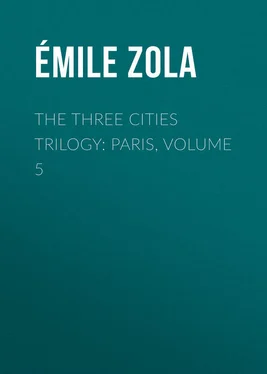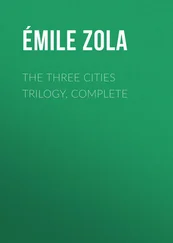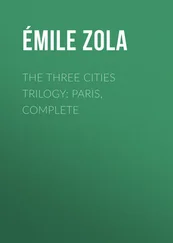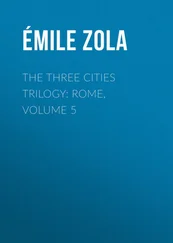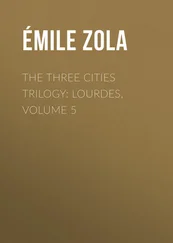Émile Zola - The Three Cities Trilogy - Paris, Volume 5
Здесь есть возможность читать онлайн «Émile Zola - The Three Cities Trilogy - Paris, Volume 5» — ознакомительный отрывок электронной книги совершенно бесплатно, а после прочтения отрывка купить полную версию. В некоторых случаях можно слушать аудио, скачать через торрент в формате fb2 и присутствует краткое содержание. Жанр: literature_19, foreign_antique, foreign_prose, на английском языке. Описание произведения, (предисловие) а так же отзывы посетителей доступны на портале библиотеки ЛибКат.
- Название:The Three Cities Trilogy: Paris, Volume 5
- Автор:
- Жанр:
- Год:неизвестен
- ISBN:нет данных
- Рейтинг книги:3 / 5. Голосов: 1
-
Избранное:Добавить в избранное
- Отзывы:
-
Ваша оценка:
- 60
- 1
- 2
- 3
- 4
- 5
The Three Cities Trilogy: Paris, Volume 5: краткое содержание, описание и аннотация
Предлагаем к чтению аннотацию, описание, краткое содержание или предисловие (зависит от того, что написал сам автор книги «The Three Cities Trilogy: Paris, Volume 5»). Если вы не нашли необходимую информацию о книге — напишите в комментариях, мы постараемся отыскать её.
The Three Cities Trilogy: Paris, Volume 5 — читать онлайн ознакомительный отрывок
Ниже представлен текст книги, разбитый по страницам. Система сохранения места последней прочитанной страницы, позволяет с удобством читать онлайн бесплатно книгу «The Three Cities Trilogy: Paris, Volume 5», без необходимости каждый раз заново искать на чём Вы остановились. Поставьте закладку, и сможете в любой момент перейти на страницу, на которой закончили чтение.
Интервал:
Закладка:
Duthil smiled and responded: "I suppose that peace has been signed and ratified now that you have secured your engagement at the Comedie."
"Peace? No!" she protested. "No, no. There will be no peace between us until I have made my debut . After that, we'll see."
They both laughed; and then Duthil, by way of paying his court, told her how good-naturedly Dauvergne, the new Minister of Public Instruction and Fine Arts, had adjusted the difficulties which had hitherto kept the doors of the Comedie closed upon her. A really charming man was Dauvergne, the embodiment of graciousness, the very flower of the Monferrand ministry. His was the velvet hand in that administration whose leader had a hand of iron.
"He told me, my beauty," said Duthil, "that a pretty girl was in place everywhere." And then as Silviane, as if flattered, pressed closely beside him, the deputy added: "So that wonderful revival of 'Polyeucte,' in which you are going to have such a triumph, is to take place on the day after to-morrow. We shall all go to applaud you, remember."
"Yes, on the evening of the day after to-morrow," said Silviane, "the very same day when the wedding of the Baron's daughter will take place. There'll be plenty of emotion that day!"
"Ah! yes, of course!" retorted Duthil, "there'll be the wedding of our friend Gerard with Mademoiselle Camille to begin with. We shall have a crush at the Madeleine in the morning and another at the Comedie in the evening. You are quite right, too; there will be several hearts throbbing in the Rue Godot-de-Mauroy."
Thereupon they again became merry, and jested about the Duvillard family – father, mother, lover and daughter – with the greatest possible ferocity and crudity of language. Then, all at once Silviane exclaimed: "Do you know, I'm feeling awfully bored here, my little Duthil. I can't distinguish anything, and I should like to be quite near so as to see it all plainly. You must take me over yonder, close to that machine of theirs."
This request threw Duthil into consternation, particularly as at that same moment Silviane perceived Massot outside the wine shop, and began calling and beckoning to him imperiously. A brief conversation then ensued between the young woman and the journalist: "I say, Massot!" she called, "hasn't a deputy the right to pass the guards and take a lady wherever he likes?"
"Not at all!" exclaimed Duthil. "Massot knows very well that a deputy ought to be the very first to bow to the laws."
This exclamation warned Massot that Duthil did not wish to leave the balcony. "You ought to have secured a card of invitation, madame," said he, in reply to Silviane. "They would then have found you room at one of the windows of La Petite Roquette. Women are not allowed elsewhere… But you mustn't complain, you have a very good place up there."
"But I can see nothing at all, my dear Massot."
"Well, you will in any case see more than Princess de Harn will. Just now I came upon her carriage in the Rue du Chemin Vert. The police would not allow it to come any nearer."
This news made Silviane merry again, whilst Duthil shuddered at the idea of the danger he incurred, for Rosemonde would assuredly treat him to a terrible scene should she see him with another woman. Then, an idea occurring to him, he ordered a bottle of champagne and some little cakes for his "beautiful friend," as he called Silviane. She had been complaining of thirst, and was delighted with the opportunity of perfecting her intoxication. When a waiter had managed to place a little table near her, on the balcony itself, she found things very pleasant, and indeed considered it quite brave to tipple and sup afresh, while waiting for that man to be guillotined close by.
It was impossible for Pierre and Guillaume to remain up there any longer. All that they heard, all that they beheld filled them with disgust. The boredom of waiting had turned all the inquisitive folks of the balcony and the adjoining room into customers. The waiter could hardly manage to serve the many glasses of beer, bottles of expensive wine, biscuits, and plates of cold meat which were ordered of him. And yet the spectators here were all bourgeois , rich gentlemen, people of society! On the other hand, time has to be killed somehow when it hangs heavily on one's hands; and thus there were bursts of laughter and paltry and horrible jests, quite a feverish uproar arising amidst the clouds of smoke from the men's cigars. When Pierre and Guillaume passed through the wine shop on the ground-floor they there found a similar crush and similar tumult, aggravated by the disorderly behaviour of the big fellows in blouses who were drinking draught wine at the pewter bar which shone like silver. There were people, too, at all the little tables, besides an incessant coming and going of folks who entered the place for a "wet," by way of calming their impatience. And what folks they were! All the scum, all the vagabonds who had been dragging themselves about since daybreak on the lookout for whatever chance might offer them, provided it were not work!
On the pavement outside, Pierre and Guillaume felt yet a greater heart-pang. In the throng which the guards kept back, one simply found so much mire stirred up from the very depths of Paris life: prostitutes and criminals, the murderers of to-morrow, who came to see how a man ought to die. Loathsome, bareheaded harlots mingled with bands of prowlers or ran through the crowd, howling obscene refrains. Bandits stood in groups chatting and quarrelling about the more or less glorious manner in which certain famous guillotines had died. Among these was one with respect to whom they all agreed, and of whom they spoke as of a great captain, a hero whose marvellous courage was deserving of immortality. Then, as one passed along, one caught snatches of horrible phrases, particulars about the instrument of death, ignoble boasts, and filthy jests reeking with blood. And over and above all else there was bestial fever, a lust for death which made this multitude delirious, an eagerness to see life flow forth fresh and ruddy beneath the knife, so that as it coursed over the soil they might dip their feet in it. As this execution was not an ordinary one, however, there were yet spectators of another kind; silent men with glowing eyes who came and went all alone, and who were plainly thrilled by their faith, intoxicated with the contagious madness which incites one to vengeance or martyrdom.
Guillaume was just thinking of Victor Mathis, when he fancied that he saw him standing in the front row of sightseers whom the guards held in check. It was indeed he, with his thin, beardless, pale, drawn face. Short as he was, he had to raise himself on tiptoes in order to see anything. Near him was a big, red-haired girl who gesticulated; but for his part he never stirred or spoke. He was waiting motionless, gazing yonder with the round, ardent, fixed eyes of a night-bird, seeking to penetrate the darkness. At last a guard pushed him back in a somewhat brutal way; but he soon returned to his previous position, ever patient though full of hatred against the executioners, wishing indeed to see all he could in order to increase his hate.
Then Massot approached the brothers. This time, on seeing Pierre without his cassock, he did not even make a sign of astonishment, but gaily remarked: "So you felt curious to see this affair, Monsieur Froment?"
"Yes, I came with my brother," Pierre replied. "But I very much fear that we shan't see much."
"You certainly won't if you stay here," rejoined Massot. And thereupon in his usual good-natured way – glad, moreover, to show what power a well-known journalist could wield – he inquired: "Would you like me to pass you through? The inspector here happens to be a friend of mine."
Then, without waiting for an answer, he stopped the inspector and hastily whispered to him that he had brought a couple of colleagues, who wanted to report the proceedings. At first the inspector hesitated, and seemed inclined to refuse Massot's request; but after a moment, influenced by the covert fear which the police always has of the press, he made a weary gesture of consent.
Читать дальшеИнтервал:
Закладка:
Похожие книги на «The Three Cities Trilogy: Paris, Volume 5»
Представляем Вашему вниманию похожие книги на «The Three Cities Trilogy: Paris, Volume 5» списком для выбора. Мы отобрали схожую по названию и смыслу литературу в надежде предоставить читателям больше вариантов отыскать новые, интересные, ещё непрочитанные произведения.
Обсуждение, отзывы о книге «The Three Cities Trilogy: Paris, Volume 5» и просто собственные мнения читателей. Оставьте ваши комментарии, напишите, что Вы думаете о произведении, его смысле или главных героях. Укажите что конкретно понравилось, а что нет, и почему Вы так считаете.
